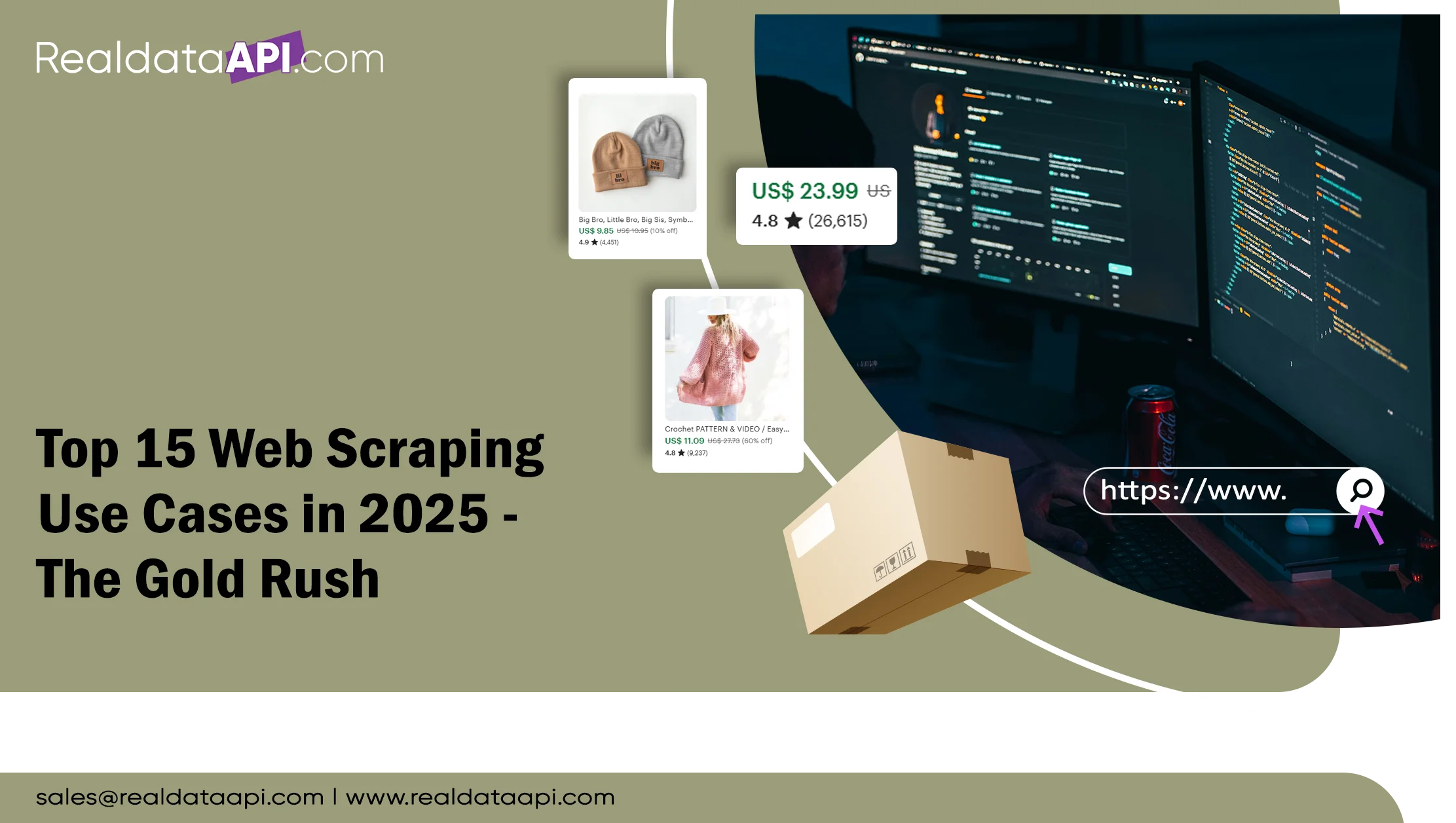

Introduction
The digital era has amplified the importance of data, transforming web scraping into a vital tool for businesses across industries. In 2025, the "Gold Rush" for data is more significant than ever as organizations rely on web scraping to extract actionable insights, refine strategies, and stay competitive. By automating data collection from online sources, businesses can monitor market trends, analyze customer sentiment, and track competitor activities in real-time.
This technology empowers industries such as e-commerce, real estate, finance, and travel to make informed decisions, optimize operations, and enhance customer experiences. From price monitoring scraping to social media sentiment scraping, the applications are vast and transformative.
As data becomes the currency of success, web scraping ensures businesses can navigate the competitive landscape with agility and precision. In this blog, we explore the top 15 web scraping use cases, showcasing how this tool is shaping the future of data-driven decision-making.
What is Web Scraping?

Web scraping is the process of extracting data from websites and online platforms using automated tools or scripts. It enables users to collect large volumes of information, such as product prices, customer reviews, market trends, and competitor insights, directly from web pages. This data is then organized into a structured format, such as spreadsheets or databases, for analysis and decision-making. Web scraping is widely used across industries like e-commerce, finance, real estate, and travel for tasks such as price monitoring, lead generation, and market research. By automating data collection, web scraping saves time and provides valuable insights for businesses.
Why Web Scraping is the "Gold Rush" of 2025

The digital revolution has catapulted data into the spotlight as the most valuable resource of the modern era. In 2025, the demand for real-time, actionable insights has made web scraping a critical tool for businesses. It enables organizations to extract and analyze vast amounts of data from online sources, offering a competitive advantage across industries.
One of the most prominent applications is price monitoring scraping, where businesses track competitor prices to ensure competitive positioning. For e-commerce, this means optimizing pricing strategies and staying ahead in a fiercely competitive market. Similarly, social media sentiment scraping allows companies to gauge customer opinions and identify emerging trends, helping them tailor marketing campaigns or improve products.
The beauty of web scraping lies in its versatility. Retailers leverage it for product availability scraping, ensuring stock levels align with market demand. Real estate companies use real estate data scraping to analyze property trends and valuations, while the travel industry benefits from travel fare comparison scraping, which enables dynamic pricing strategies.
In 2025, data is more than just numbers; it’s actionable intelligence. Web scraping allows industries to mine this gold, turning raw information into strategic insights. From startups to large enterprises, the ability to extract, analyze, and act on data has transitioned from a luxury to an operational necessity.
As businesses continue to adopt this transformative tool, web scraping is solidifying its role as the cornerstone of data-driven success. Whether it’s understanding customer sentiment or optimizing product offerings, web scraping is empowering organizations to thrive in an increasingly competitive landscape.
The "Gold Rush" of data is here, and web scraping ensures businesses can claim their share of the treasure. Let’s go through them one by one.
1. Transforming E-commerce Strategies

Web scraping has revolutionized e-commerce by enabling businesses to gain real-time insights into market trends, competitor activities, and customer preferences. By utilizing e-commerce web scraping, companies can monitor product prices, analyze customer reviews, and track inventory levels across major platforms. This data empowers retailers to implement dynamic pricing strategies, optimize their product offerings, and improve overall customer satisfaction. For instance, scraping data from Amazon or Walmart can reveal competitive pricing trends and product availability, allowing businesses to stay ahead in the market.
2. Enhancing Pricing Strategies

In a competitive marketplace, pricing can make or break a business. Web scraping helps businesses monitor competitor prices and market fluctuations with precision. By leveraging price monitoring scraping, companies can gather accurate pricing data from competitors' websites and adjust their strategies accordingly. This practice is especially prevalent in industries like consumer electronics and travel, where price sensitivity is high. The ability to scrape and analyze pricing trends ensures businesses remain competitive while maximizing their profit margins.
3. Gaining Competitive Insights

Understanding competitor behavior is critical for success. Web scraping provides businesses with invaluable insights into competitors' pricing, promotions, and product launches. Competitor price scraping goes beyond simple price comparisons by offering a holistic view of market positioning. With this data, businesses can identify gaps in their offerings and develop strategies to outperform their rivals. For example, tracking promotional campaigns through web scraping allows companies to time their own discounts effectively.
4. Optimizing Inventory Management

Efficient inventory management relies on real-time data. Web scraping enables businesses to monitor stock levels and product availability across various platforms. This practice, often referred to as product availability scraping, helps companies anticipate demand and avoid stockouts. Retailers can adjust their procurement processes based on scraped data, ensuring they maintain optimal inventory levels. Additionally, tracking competitors' inventory can reveal which products are trending, providing opportunities to capture market share.
5. Understanding Customer Sentiment

Customer feedback is a powerful tool for improving products and services. Web scraping allows businesses to collect and analyze reviews, ratings, and comments from multiple platforms. Through customer sentiment analysis, companies can identify strengths and weaknesses in their offerings. For instance, analyzing product reviews on e-commerce platforms can reveal recurring issues or highlight features that resonate with customers. This data-driven approach ensures that businesses remain customer-focused and continuously improve their offerings.
6. Identifying Market Trends

Staying ahead of industry trends is essential for maintaining relevance. Web scraping collects data from news articles, industry blogs, and competitor websites to identify emerging patterns. Market trend scraping provides actionable insights into consumer preferences and evolving demands. Businesses can use this information to launch innovative products, enter new markets, or adapt their marketing strategies. For example, scraping data from fashion blogs can help retailers identify upcoming seasonal trends and stock accordingly.
7. Boosting Lead Generation

Quality leads are the lifeblood of any business. Web scraping simplifies the process of collecting potential customer information from websites and directories. Lead generation scraping extracts contact details, such as email addresses and phone numbers, which can be used for targeted marketing campaigns. This practice is particularly effective for B2B companies looking to expand their client base. By automating lead collection, businesses can focus on nurturing relationships and converting prospects into loyal customers.
8. Enhancing SEO Performance

Search engine optimization (SEO) is crucial for online visibility, and web scraping plays a key role in fine-tuning SEO strategies. By using SEO scraping tools, businesses can analyze competitors' keywords, backlinks, and content performance. This data helps identify opportunities for improvement and ensures that content aligns with search engine algorithms. Additionally, scraping search engine results pages (SERPs) provides insights into ranking trends and user behavior, enabling businesses to craft effective SEO campaigns.
9. Empowering Real Estate Decisions

The real estate industry thrives on accurate and up-to-date information. Web scraping gathers data on property listings, prices, and market conditions, providing valuable insights for investors and agents. Real estate data scraping enables professionals to identify lucrative opportunities, monitor market trends, and make data-driven decisions. For instance, scraping property listings from online marketplaces can reveal pricing patterns and highlight undervalued properties, giving investors a competitive edge.
10. Navigating the Job Market

The job market is constantly evolving, and web scraping helps both employers and job seekers stay informed. By extracting data from job boards and company career pages, job market scraping provides insights into hiring trends, salary benchmarks, and in-demand skills. Recruiters can use this information to attract top talent, while job seekers can identify opportunities that align with their expertise. This data-driven approach ensures a better match between employers and employees.
11. Comparing Travel Fares

Travelers are always on the lookout for the best deals, and businesses can cater to this demand by leveraging web scraping. Travel fare comparison scraping collects pricing data from airlines, hotels, and travel agencies, enabling companies to offer competitive rates. This use case is particularly valuable for travel platforms and agencies aiming to attract budget-conscious customers. By analyzing fare trends, businesses can also predict peak travel periods and adjust their offerings accordingly.
12. Informing Financial Decisions

In the financial sector, timely and accurate data is paramount. Web scraping provides investors, analysts, and financial institutions with access to stock prices, company reports, and economic indicators. Financial data scraping allows stakeholders to make informed decisions, manage portfolios, and assess risks effectively. For instance, scraping data from stock exchanges can reveal market trends and help identify profitable investment opportunities.
13. Monitoring Social Media Sentiment

Social media platforms are treasure troves of consumer opinions and trends. Web scraping enables businesses to track mentions, hashtags, and comments to gauge public sentiment. Social media sentiment scraping helps brands monitor their reputation, identify potential crises, and measure the impact of marketing campaigns. By analyzing this data, companies can respond proactively to customer feedback and stay connected with their audience.
14. Conducting Product Research

Product development requires a deep understanding of market needs and customer preferences. Web scraping facilitates product research scraping by collecting data on competitor offerings, customer reviews, and industry trends. Businesses can use this information to refine their product designs, identify gaps in the market, and ensure successful launches. For example, analyzing reviews for similar products can reveal features that customers value most, guiding design and development efforts.
15. Streamlining Content Curation

Content-driven platforms need a constant supply of fresh and relevant material to engage their audience. Web scraping automates the collection of articles, blogs, and news from various sources, enabling efficient content aggregation. This use case is essential for media companies, marketers, and bloggers looking to streamline their workflows. By curating high-quality content, businesses can maintain their audience's interest and establish authority in their niche.
Conclusion
In 2025, web scraping continues to unlock new opportunities across industries. Whether it's real estate data scraping, e-commerce web scraping, or product research scraping, the potential is immense. At the forefront of this transformation is Real Data API, offering cutting-edge solutions to meet all your web scraping needs.
Ready to harness the power of data? Contact Real Data API today and revolutionize your business strategy!












